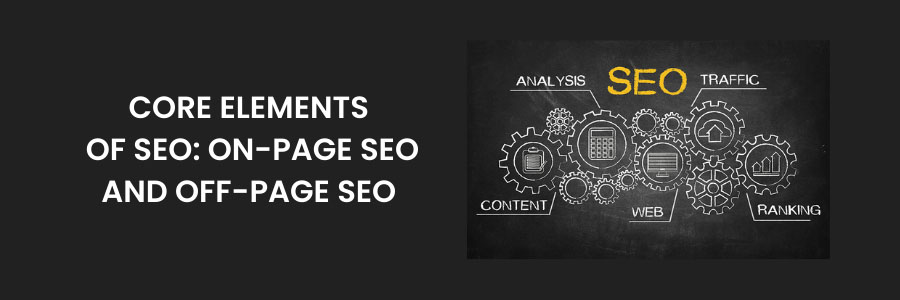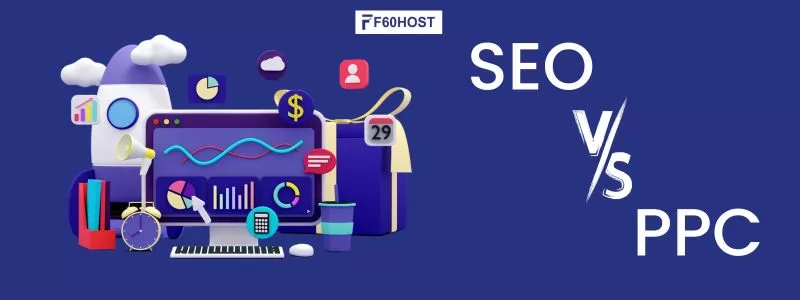Core Elements of SEO: On-Page SEO and Off-Page SEO

A Strong SEO Strategy Has Five Basic Components
Search engine optimization (SEO), the practice of customizing your website to the algorithms that search engines use to rank websites based on “signals” that the site emits, is one of the key marketing methods that can help online retailers develop a successful Internet business.
However, because search engine algorithms change over time as the Internet advances, online shops must evolve as well. To claim the greatest potential ranks for relevant keywords, we must stay current with best practices.
If you want your website to rank well in search engines in 2022, here are Five SEO components that should be aware of while optimizing your website for top search engine rankings.
What is On-Page SEO?
Consider some of the most fundamental SEO strategies:
- Including keywords in the title and copy of your page.
- The meta tags should be optimized to stand out on search engine results pages (SERPs)
- Using HTML code and alt tags.
What is Off-Page SEO?
While on-page SEO refers to the elements you can manage on your own website, off-page SEO refers to page ranking factors that happen outside of your website, such as backlinks from other websites.
- Increase the number of high-quality backlinks on your website
- Social media posts, social posts that get a lot of hits will undoubtedly aid increase site traffic and producing a lot of link shares.
Five Basic Components
1. Keywords.
Keyword research is the first step in creating a successful SEO strategy. Those who are successful at SEO understand what customers are looking for when they use a search engine to locate their business. These keywords are used to direct focused visitors to their products. You may start brainstorming potential keywords and determining how competitive they are by utilizing the Google AdWords Keyword Tool. If you find that some keywords in your field are too competitive, go for long-tail keywords (two to five phrases), which are simpler to rank. The longer the keyword, the less competition for that phrase in the search engines.
2. Meta tags.
Meta tags are still vital in SEO. By putting a phrase into a search engine, you may see how it appears in the title of a website. Google uses the title of your page as an indicator of keyword relevance. That page’s description is the same way. (Don’t worry about the keyword title tag; according to Google, webmasters and anybody trying to rank for specific keywords disregard it.)
3. Content.
As the saying goes, content is king. Quality content is the best way to rank for keywords and provide excellent user experiences, according to search engines. It will also assist you in educating your consumers, and establishing yourself as an authority in your field will lead to higher sales.
4. Backlinks.
Backlinks are the queen if the content is king. It’s important to remember that it’s not about how many links a site has, but rather how many high-quality links connect back to it. Submit monthly or bi-monthly news releases about any exciting company, and contact popular blogs in your niche to see if you may collaborate to earn a backlink from their website. Make the greatest product site you can so that people who are talking about the things you sell will link back to you. Create visuals or noteworthy information to get bloggers and news sites to link to your stuff.
You can use a variety of organic methods to get successful outcomes, including:
- Guest blogging
- Press Release
5. Social media.
Since the inception of social media, algorithms have evolved significantly. Many content websites are community-oriented: Digg started allowing users to vote on which stories should be shown on the front page, while YouTube ranks frontpages based on views and user ratings. E-commerce stores must therefore build a strong social media presence on platforms such as Facebook, Pinterest, Twitter, and others. Search engines pick up on these social media sites’ indications of authority and impact.
Analyze your competitors
In addition to optimizing these Five areas of your website, look at your competitors’ on-page optimization, off-page optimization (competitive link analysis), and social media strategies. While you may be doing many of the same things as your competitors, it’s critical to think outside the box to gain an advantage
Is On-Page SEO more important than Off-Page SEO?
It’s not a case of choosing between off-page and on-page SEO; that’d be like deciding between a foundation and a roof for your home. In a complementary manner, on-page and off-page SEO work together to boost your search engine rankings.
However, before focusing too much on off-page SEO, SEOs recommend having your on-page SEO ducks in a straight.
You should lay the foundation first before constructing the rest of the home, just like you would when building a house. You may need to revisit your on-page SEO from time to time, just like you would with a foundation. By balancing the two, you’ll be able to make your website “bilingual,” meaning that both your users and search engine robots will be able to comprehend it, and your rankings will begin to rise.



